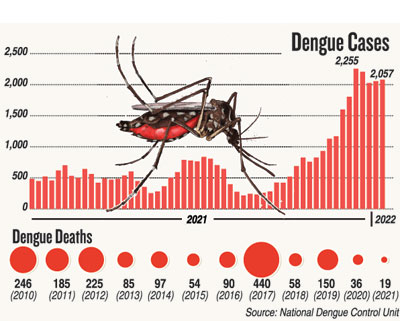News
Rapidly rising dengue patient tally prompts epidemic warning
The number of dengue patients remained high in the Western Province with more than 50% reported from the three districts in the province.
Nearly 7,000 dengue patients have been reported as at January 27. And 53.4% are from the Western Province.
There’s an increasing number of patients infected with the dengue virus type 3 (DENV-3), Dr Shilanthi Seneviratne, consultant community physician of the National Dengue Control Unit (NDCU), said. There are strains of the dengue virus in Sri Lanka and type 2 had been prominent during the 2017 epidemic. 
“With the frequency of type 3 being detected there is a potential for an epidemic,” she warned. “This is because people have not developed immunity to it. A person can be infected with dengue four times as each strain is different from the other, and patients only develop immunity for the type they contract.’’
Eighty-three Medical Officer of Health (MOH) areas have been flagged as high-risk of which 12 showed a rising number of patients compared with the previous week. Forty-two MOH areas report persistently high numbers.
Meanwhile, Wadduwa, Udunuwara, Wattegama, Dambulla, Hikkaduwa, Kopay, Karaveddy, Kinniya, south Kalmunai, Pottuvil, Maho, Pannala, Rasnayakapura, and Mundel, have been newly identified as high–risk.
A district dengue review meeting and training workshop for MOH staff was done in Puttalam. In addition, mosquito control programmes are underway island-wide. These include education and raising awareness among people, entomological surveys to find mosquito breeding sites and house-to-house checks.
A circular on January 12 has called for intersectoral coordination among public and private institutions to control the outbreak. This makes dengue prevention and control activities mandatory in all places.
Provincial governors are responsible for ensuring coordination among grassroots stakeholders. Institutions are also required to give a monthly report to the MOH. Dengue control activities must be done every week with instructions from the MOH.
Cooperation from people is vital to stop dengue from becoming an epidemic, said health officials at a press conference on Thursday. Steps taken by the Ministry of Health alone are insufficient. Meanwhile, weekly checks in schools, religious institutions, offices and other public places have been recommended. Places of worship have also been recognised as a source of mosquito breeding.
The best way to say that you found the home of your dreams is by finding it on Hitad.lk. We have listings for apartments for sale or rent in Sri Lanka, no matter what locale you're looking for! Whether you live in Colombo, Galle, Kandy, Matara, Jaffna and more - we've got them all!

